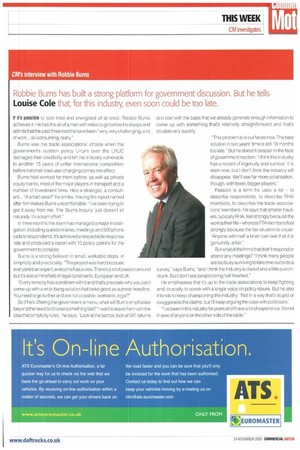CM's interview with Robbie Burns
Page 27

If you've noticed an error in this article please click here to report it so we can fix it.
Robbie Burns has built a strong platform for government discussion. But he tells Louise Cole that, for this industry, even soon could be too late.
If it's possible to look tired and energised all at once, Robbie Burns achieves it. He has the air of a man with miles to go before he sleeps and admits that the pastthree months have been "very, very challenging, a lot of work... all-consuming, really."
Burns was the trade associations' choice when the government's sudden policy U-turn over the LRUC damaged their credibility and left the industry vulnerable to another 15 years of unfair international competition before national road-user charging comes into effect.
Burns had worked for them before, as well as private equity banks, most of the major players in transport and a number of investment firms. He's a strategist, a consultant... "A smart-arse?" he smiles. Having the report named after him makes Burns uncomfortable: "I've been trying to get it away from me. The 'Burns Inquiry' just doesn't sit naturally. It's a team effort."
In three months this team has managed a major investigation, including questionnaires, meetings and 500 phone calls to respondents. It's achieved a respectable response rate and produced a report with 10 policy options for the government to consider.
Burns is a strong believer in small, workable steps, in simplicity and practicality: "This project was hard because everyone's an expert, everyone has a view. There's a lot of passion around but it's also a minefield of legal constraints, European and UK.
'Every remedy has a problem with it and that's precisely why you can't come up with a whiz-bang solution that looks good as a press headline. You need to go further and ask is it possible, workable, legal?"
So if he's offering the government a menu, what will Burns emphasise beyond the need to choose something fast? "I want to leave them with the idea that simplicity rules," he says. "Look at the tachos, look at VAT returns and start with the basis that we already generate enough information to come up with something that's relatively straightforward and that's do-able very quickly.
"This problem is in our faces now. The best solution in two years' time is still 18 months too late." But he doesn't despair in the face of government inaction: "I think this industry has a record of ingenuity and survival. It is stark now, Out I don't think the industry will disappear. We'll see tar more polarisation, though, with fewer, bigger players."
Passion is a term he uses a lot to
describe respondents, to describe RHA members, to describe the trade associations' members. He says that smaller hauliers, typically RHA, feel strongly because the work is their life-whereas FTA members feel strongly because the tax situation is unjust. -Anyone with half a brain can see that it is genuinely unfair."
But what of the firms that didn't respond or attend any meetings? "I think many people are too busy surviving to take time outto do a survey," says Burns, "and I think the industry is dazed and a little punchdrunk. But I don't see people being half-hearted."
He emphasises that it's up to the trade associations to keep fighting and, crucially, to speak with a single voice on policy issues. But he also intends to keep championing the industry: 'Not in a way that's stupid or exaggerates the claims, but I'll keep arguing the case with politicians.
"I've been in this industry for years and I have a lot of experience. I'm not in awe of anyone on the other side of the table."






































































































































































































